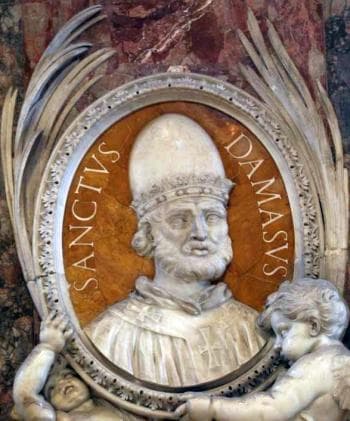Pope Saint Damasus I
Saint
Feast Day: December 11
Death: December 11, 384
Biography
Pope Saint Damasus I, whose birth name was Sant'Antonio dezel Pantaleone, was born around the year 306 in Rome, Italy. He came from a pious family, with his father being a priest in Rome and serving in the church of Saint Laurence. Raised in this religious environment, Damasus grew up with a strong devotion to the Catholic faith. Early in his career, Damasus served as a deacon in his father's church, Saint Laurence. His talents and dedication did not go unnoticed, and he was soon appointed as an assistant to Pope Liberius. This position allowed him to gain valuable experience and knowledge of Church matters. In 366, a disputed election arose for the papacy, resulting in Damasus being chosen as the 37th pope. However, a minority faction selected an anti-pope named Ursinus, leading to a period of schism and violence in Rome. Damasus faced false accusations of committing a crime during this chaotic time. Despite the internal struggles within the Church, Damasus's pontificate faced external challenges as well. The rise of Arianism, a heretical belief that denied the divinity of Jesus Christ, was a significant issue during his reign. Damasus staunchly opposed Arianism and worked to combat its influence. He also faced schisms and breakaway groups in Antioch, Constantinople, Sardinia, and even Rome itself. However, it was during Damasus's tenure that a significant milestone was achieved for Christianity. In 380, Emperor Theodosius I declared Christianity as the official religion of the Roman state, a momentous event that marked a turning point in the history of the Church. Damasus also played a crucial role in defining the biblical canon. He supported the Council of Rome in 374, which established the list of valid books of the Bible. Furthermore, he actively participated in the Grand Council of Constantinople in 381, which denounced Arianism. One of Damasus's most significant contributions to the Church was his patronage of Saint Jerome. He commissioned Jerome to translate the scriptures into Latin, a project that eventually became known as the Vulgate. This translation became the standard for the Western Church for centuries to come and played a vital role in spreading the Word of God. Besides his service to the Church, Damasus was also known for his efforts in preserving and beautifying sacred spaces. He restored catacombs, shrines, and the tombs of martyrs, ensuring that these holy sites were maintained for veneration. Damasus was also a proficient writer and poet. He composed metrical inscriptions and poems dedicated to the martyrs. In his writings, he expressed his desire to be buried alongside the early martyrs in the catacombs. However, he acknowledged that his low position as a sinner would profane the sanctity of such a revered place. Pope Saint Damasus I passed away on 11 December 384 in Rome due to natural causes. He was buried in the Mark and Marcellianus catacombs in Rome initially. Later, his remains were transferred to the church of San Lorenzo in Damaso, where he was reburied. Although Damasus was never formally canonized through the Congregation for the Causes of Saints, he is recognized as a saint in the Catholic Church. His feast day is celebrated on 11 December, commemorating his death anniversary. Throughout his life, Pope Saint Damasus I championed the Catholic faith, fighting against heresy and division within the Church. His patronage of Saint Jerome's translation project and his efforts to preserve sacred spaces left a lasting impact on the Church. Today, he is revered as a devoted servant of God and a patron saint of archeologists.
